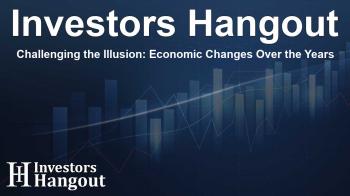Challenging the Illusion: Economic Changes Over the Years

Understanding the Economic Shifts
In recent decades, the landscape of our economy has undergone significant transformations that many may not fully recognize. It's essential to grasp these changes to make sense of our current situation. From the period between 1945 and 1975, wages gained a fair share of the economy, but the story shifted dramatically after that. Wages were approximately 50% of the national income in what is often referred to as the 'glorious 30 years' of growth.
The Decline of Wages
Sadly, since the mid-1970s, wages have experienced a disturbing decline in their share of the economy. As productivity and overall economic growth continued, instead of reaping the benefits, workers saw their share dwindle. This wealth transfer has amounted to a staggering $150 trillion, which shifted from labor to the ownership class, emphasizing a growing divide in economic advantage.
Impact of Financialization
In the 1980s, the concept of financialization took hold. Unlimited access to credit led to a synthetic economic boom marked by corporate mergers and acquisitions. The meaning of home ownership began to change as personal assets became characterized as commodities, editable via global financial markets. These trends culminated in an environment where debt grew at an alarming rate, surpassing GDP growth, indicating that the underlying economy was becoming hollow.
Consequences of the 2008 Financial Crisis
The Global Financial Crisis of 2008 highlighted the serious flaws in this synthetic growth model. The reliance on subprime mortgage securities brought the world economy to its knees. What followed was a profound shift where organic and sustainable economic practices became secondary to excessive debt accumulation and asset inflation.
The Role of Federal Debt
Over the years, Federal debt has escalated significantly, rising from 40% to an unsustainable 120% of GDP. This explosive growth in debt has fueled the so-called 'wealth effect,' wherein individuals feel wealthy because of inflated asset values. This feeling of wealth encourages borrowing and spending, particularly among the wealthiest households.
Wealth Inequality and Consumption
Currently, the top 10% of households contribute to nearly 50% of all consumer spending, making the economy extremely reliant on their purchasing decisions. Unfortunately, this reliance has exacerbated wealth inequality, as the benefits of this economic growth have predominantly accrued to the wealthiest citizens. Consequently, wage earners have seen their purchasing power diminish, creating a sense of disparity and frustration.
The Threat of an Economic Doom Loop
We find ourselves at a critical juncture: if the Everything Bubble continues to inflate, we risk shattering the social fabric due to extreme wealth inequality. However, if this bubble bursts, the resultant economic contraction will lead to widespread job losses and another recession. In either scenario, average citizens shoulder the burden of policies that favor the wealthy few.
Challenges Facing Future Generations
Moreover, younger generations are heavily affected by a system favoring asset ownership while denying affordable homeownership and family formation. This generational burden of debt sets the stage for a potential demographic crisis with plummeting birth rates. Today’s policies may lead to irrevocable consequences for these individuals as they navigate a landscape marked by economic uncertainty.
Policy Considerations
Looking ahead, we must reevaluate the policies that have fostered this imbalance. Strategies relying solely on financial manipulation rather than real economic growth can lead to catastrophic failures. As we reflect on the mistakes of the past and present, it becomes clearer that relying on asset bubbles to stimulate the economy has brought us to a crossroads fraught with real-world challenges. The consequences of inaction with respect to these issues will echo for decades.
Frequently Asked Questions
What has caused the decline in wages?
The decline in wages since the mid-1970s is attributed to a shift where economic gains have disproportionately benefited capital owners rather than workers.
How does financialization affect the economy?
Financialization transitions assets into commodities, promoting a debt-driven economy that often overlooks sustainable growth.
What risks does the Everything Bubble present?
The Everything Bubble can lead to societal instability as wealth inequality grows. If it bursts, consumer spending may collapse, leading to severe economic contraction.
Who benefits from the current economic policies?
The wealthiest households benefit the most, as economic growth is concentrated among them, exacerbating inequality.
What future challenges do younger generations face?
Younger generations face increased debt burdens, limited access to affordable homes, and pressures that could lead to a demographic crisis.
About The Author
Contact Olivia Taylor privately here. Or send an email with ATTN: Olivia Taylor as the subject to contact@investorshangout.com.
About Investors Hangout
Investors Hangout is a leading online stock forum for financial discussion and learning, offering a wide range of free tools and resources. It draws in traders of all levels, who exchange market knowledge, investigate trading tactics, and keep an eye on industry developments in real time. Featuring financial articles, stock message boards, quotes, charts, company profiles, and live news updates. Through cooperative learning and a wealth of informational resources, it helps users from novices creating their first portfolios to experts honing their techniques. Join Investors Hangout today: https://investorshangout.com/
The content of this article is based on factual, publicly available information and does not represent legal, financial, or investment advice. Investors Hangout does not offer financial advice, and the author is not a licensed financial advisor. Consult a qualified advisor before making any financial or investment decisions based on this article. This article should not be considered advice to purchase, sell, or hold any securities or other investments. If any of the material provided here is inaccurate, please contact us for corrections.

